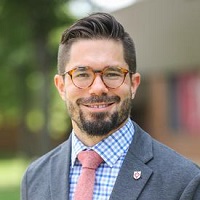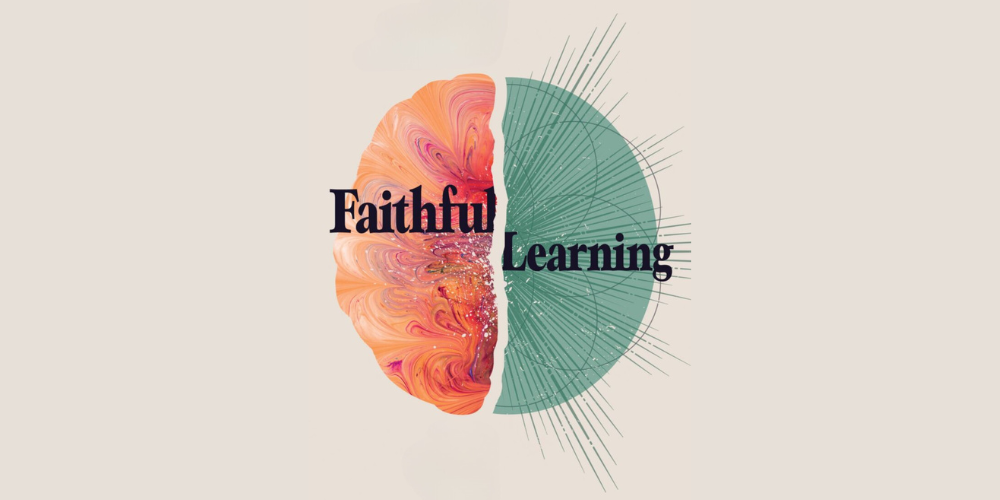The following is a discussion about Jacob Shatzer’s new book Faithful Learning: A Vision for Theologically Integrated Education (Brentwood, TN: B&H Academic, 2023).

Jacob Shatzer, PhD.
Jacob is Executive Director of BibleMesh and serves as Associate Professor of Theological Studies; Associate Provost and Dean of Instruction, Administrative Office of the Provost at Union University in Jackson, Tennessee.
What is your book about and from where did the vision for it emerge?
I have always loved studying theology. I came to Union University many years ago and enjoyed studying the Bible as a student, but also was really animated by faculty across campus who were good at connecting their faith with their different fields of study. It was something that I took for granted as a student—I just thought connecting the Christian faith to other academic disciplines is normal and must be easy to do!
Over time, as I ended up on faculty myself at another institution, I realized that these conversations were more difficult to have than I had thought they were as a student. One thing that I hoped to eventually develop was a book that could introduce faculty to basic ideas on Christian doctrine, basic ideas that many of them may have heard over the years in church but hadn’t really thought about in an organized way. I knew that helping them think about doctrine in an organized way was one step down the path in serving their students well and in bringing their faith and learning together in creative ways.
What do you mean when you say this book is an introduction to theology for non-theologians?
One of the dynamics that I am trying to work with—as anyone who teaches at any kind of Christian school knows—is there can sometimes be a divide between people who teach Bible and theology and people who teach everything else.
At some schools, at least, the Bible and theology faculty are viewed as the theology or doctrine police. Teachers can feel like ‘oh here comes the theologian telling us what we have to think’. Bible scholars and theologians have spent a lot of time in this material and have a lot to help us see. My hope is that each chapter that I wrote serves the purpose of teaching the foundations of Christian doctrine.
My hope is that each chapter that I wrote serves the purpose of teaching the foundations of Christian doctrine.
I also wanted to help people and faculty and teachers in other subjects to realize that they don’t just have the task of learning these things, but that from the particular perspective of their discipline they see truths about God and His world that maybe be others don’t see. We all recognize that we need Bible scholars and theologians, certainly. But I also wanted to demonstrate that we need Christians who, for instance, are studying English and literature and see things about the way narratives work, and who actually serve the church well if they can express the faith better given their background in literature and and story.
My hope is that in one sense the book will teach faculty to better understand theology but at the same time help them to see within themselves the way that God is working in them and helping them to see and say things that the church needs to hear.
One of the ways that you try to bring that out is by involving professors in those disciplines in those very chapters themselves. What went into the decision-making process for selecting the specific conversation partners with those doctrines?
At the end of each chapter is interaction or response from a faculty member from a non-theological discipline. I asked these faculty members to consider two basic questions: In what way does this doctrine fit with the things you see in your discipline? For instance, those who study biology are often quick to connect to the doctrine of creation and see beautiful things about God’s world. I wanted faculty to both draw out those sort of things, ways that faith connects and confirms what they see.
I also wanted to ask questions like, “Where does the Christian faith actually rub up against some of the presuppositions or widely held opinions in your field?” Or, “How, as a Christian, do you navigate that while seeking to bow the knee to Christ and at the same time be a professional in your academic field of study?” Their responses deal with that kind of field of questions in different ways, demonstrating in the book the kind of questions and moving to the answers that can animate faith and learning in the classroom and scholarship.
In what way is this book meant to be a conversation starter rather than a book with all the answers?
Any book is going to be a starting point in one sense, where you have to be glad that people move from your book to dig deeper into whatever the topic is. This book would only be a success if the faculty left the book with questions that they were excited about pursuing.
This book would only be a success if the faculty left the book with questions that they were excited about pursuing.
I try to point them at the end of each chapter to current evangelical, theological resources to dive deeper into the given topic and to demonstrate to them the type of questions that might be a little unsettling at first. I’m actually okay with unsettling questions, and my hope is that people leave the book dissatisfied because they have come up with deeper and more interesting questions that will animate their work and their careers.
How might someone utilize this book for faculty development?
As Associate Provost and Dean of Instruction here at Union, I oversee our faculty development process among other things. I especially enjoy the faculty development piece. We use this book in connection with a workshop we do on faith and learning for our first-year faculty toward the end of their first year. It’s a resource that we provide for them and encourage them to go through with their colleagues.
I am aware of other universities using it this year in similar ways, some with their entire faculties. There are schools that have bought copies for all of their faculty and are having them read through it, and there are others that are using it for voluntary book groups.
This excites me because I want the book to be something that faculty use to learn and develop questions, but I also like the idea of the book being something that faculty can gather around. It is also the relationships that they develop with one another in an academic community that will sustain this kind of work for the long term.
Here is what others are saying about Jacob’s book:
“I wish I had Jacob Shatzer’s book when I first began teaching in Christian higher education. I think I would have had a better appreciation for how my colleagues in the next hall are contributing to God’s kingdom through their respective disciplines. This appreciation not only makes us better partners in education but also improves our teaching methods and thereby the faith-integration of our students.”
“As a counseling psychologist, I enjoy knowing that my students are experiencing a holistic understanding of biblical concepts in all kinds of classrooms. I want my students to learn about the doctrine of the imago Dei and its application to our mental health in my psychology classroom, and I want them to learn about it and its relation to our physical health in the exercise science classroom next door.”
“For institutions that would like to begin incorporating more integration into their organization, I encourage academic departments to consider Dr. Shatzer’s book as a resource for their faculty’s professional development. Integration will not occur overnight but requires ongoing conversations between academic disciplines and support from the school’s administration. Even so, Shatzer’s book provides an excellent start to this conversation.”
“If you read Shatzer’s book, Faithful Learning, you may come away disappointed. But it will be disappointment for the wrong reasons because everyone who reads this book will find his or her particular academic discipline lacking. However, that is not this book’s purpose. Instead, Shatzer provides a bird’s eye view of how various disciplines approach theological integration. Rather than looking for your particular discipline within Shatzer’s book, I encourage you to ask God to reveal Himself to you through one of the other areas of His world.”
Sarah J. Bracey, PhD, LPC MHSP
Psychology Program Coordinator, Campus Counselor
Welch College
“Ours is a society of increasing academic specialization and decreasing biblical and theological literacy. Christian institutions of higher education are more needed than ever. Yet, many devout Christian scholars tasked with integrating faith and learning in their teaching have never been shown how to do so in their own scholarship.”
“Jacob Shatzer’s Faithful Learning helps Christian scholars from non-theological disciplines meditate on the faith once delivered to the saints and to consider how it influences their varied disciplines. Each chapter gives an accessible introduction to an aspect of Christian doctrine and ends with reflections from scholars on how those doctrines influence their respective fields.”
“This book is a welcome aid to all Christian scholars who wish to glorify the Lord in their work. Furthermore, while aimed at scholars in Christian higher education it also has great value for Christian educators at any level.”
Blake McKinney
Assistant Professor of History and Humanities, Texas Baptist College at Southwestern Seminary
